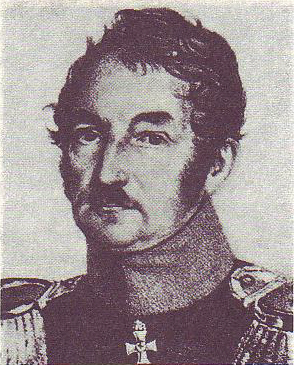 Johann
Jakob Otto August Rühle von Lilienstern (born April 16, 1780 in Berlin , †
July 1, 1847 in Salzburg ) was a Prussian lieutenant general and military
writer .
Johann
Jakob Otto August Rühle von Lilienstern (born April 16, 1780 in Berlin , †
July 1, 1847 in Salzburg ) was a Prussian lieutenant general and military
writer . Queer Places:
Alter Garnisonfriedhof
Berlin-Mitte, Mitte, Berlin, Germany
 Johann
Jakob Otto August Rühle von Lilienstern (born April 16, 1780 in Berlin , †
July 1, 1847 in Salzburg ) was a Prussian lieutenant general and military
writer .
Johann
Jakob Otto August Rühle von Lilienstern (born April 16, 1780 in Berlin , †
July 1, 1847 in Salzburg ) was a Prussian lieutenant general and military
writer .
Otto August was the son of Jakob Friedrich Rühle von Lilienstern (born May 3, 1749 in Frankfurt , † November 19, 1817 in Wittstock) and his wife Christiane Sophie Katharina, nee von Cronenfels, widowed by Quickmann (born April 20, 1751 in Berlin, † November 7, 1817 in Wittstock). His father was a second lieutenant a. D. , last in the infantry regiment "von Thüna" as well as knights council in Wittstock and owner of the estate Königsberg near Prignitz .
Rühle visited the Kadettenhaus Berlin and was on 6 December 1795 together with Heinrich von Kleist in the Guards Regiment . Since then he has had a close friendship with him. His active involvement in the military proved his membership of the Military Society . Unlike Kleist he made in the military career after he had attended since 1801 the lectures of Scharnhorst . In 1806 he fought in the corps of Prince Hohenlohe as a general staff officer during the campaign at the Battle of Jena and Auerstedt and became inactive after the surrender of Prenzlau . After the Peace of Tilsit, Rühle received permission to serve in the Weimar service . There he rose to Major and became chamberlain and governor of Prince Bernhard of Weimar . With him he was involved in 1809 in the Saxon army in the campaign against Austria . In 1811 Rühle gave up his employment and worked in agriculture, since his request for use as a teacher at the General War School was rejected because of lack of jobs.
After the campaign of 1815 he was entrusted with the direction of the Military History Department of the Prussian General Staff . In 1816 he became Colonel in the Great General Staff, the first chief editor of the newly created military weekly with Royal Cabinet Order. Rühle became chief of the general staff in Berlin in 1819. However, this function he retained only two years until he was replaced by the senior General Karl von Müffling . In 1835 he rose to lieutenant general and two years later became director of the General War School in Berlin. In addition, from May 23, 1844, Rühle was also General Inspector for Military Education and Education and President of the Military Examination Board .
He was very interested. was At times (1824-1836) he endeavored to improve the teaching of geography and history through the publication of atlases and wall maps. In this regard he worked - not without tension - with the famous cartographer Heinrich Berghaus .
His publications are not always easy to find, as he often published his works only under the abbreviation R. v. L.seover=
The close friendship with Kleist is documented by numerous letters. Kleist dedicated the essay to him to find the safe way of happiness and undisturbed, even among the greatest tribulations of life, to enjoy it. Rühle von Lilienstern, for his part, supported Kleist's literary work by co- financing, for example, the publication of the magazine Phöbus .
His knowledgeably gathered collection in particular old German paintings (auctioned in Berlin 1848) is as good as forgotten today. Lilienstern was a close friend of the landscape painter Caspar David Friedrich and his writing contributed to modern research of the artist.
Rühle married on June 30, 1808 in Dresden Henriette, widowed by Schwedthoff, born of Frankenberg-Ludwigsdorf (* 1789 in Schüttlau, † December 10, 1847 in Berlin). The marriage remained childless.age rem He adopted Jenny von Schwedthoff (born May 25, 1802, † March 10, 1888), who married the politician Julius von Schleinitz (1806-1865).
On 6 May 1846 he became an honorary member of the Royal Prussian Academy of Sciences . [1]
My published books:
https://de.wikipedia.org/wiki/Otto_August_R%C3%BChle_von_Lilienstern